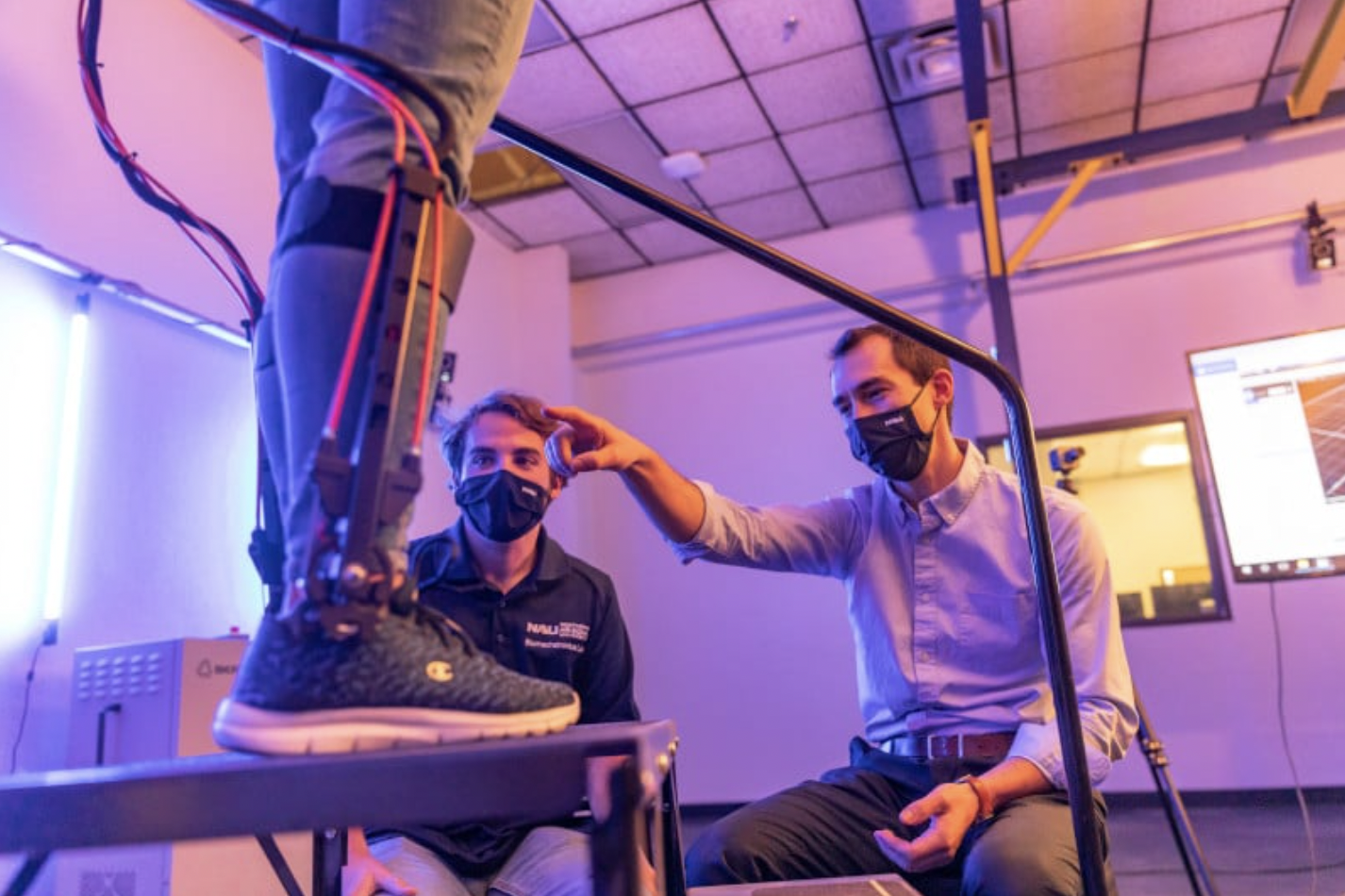Spotlight: Biomotum
Staff at Biomotum
Founded in 2019 by Dr. Zach Lerner, Dr. Ray Browning and Joe Lerner, the Biomotum System addresses the need for individuals to be mobile while being able to engage in sufficient mobility therapy. It allows the users to walk independently in the clinic, at home and in the community, which is essential to their health, independence, and general wellbeing.
Tell us about your business and the products.
Ray Browning (below as Ray): We were founded in 2019 and officially launched in 2020. We develop wearable assistive devices designed to support individuals who have difficulty walking. Our devices can be used for rehabilitation or worn daily to provide ongoing assistance. They are worn below the knee and extend to the foot. A simple way to think of it is: they're like e-bikes for your feet.
How do you feel Portland shapes or influences your company or work?
Ray: We are focused on mobility—specifically, walking mobility. Portland embraces the outdoors and the embodiment of walking. The city offers abundant hiking trails both within and beyond its limits, as well as walkable neighborhoods. It is a city that highlights accessibility using your feet. We think that walking is a beautiful act, and it’s nice to be in a city that facilitates and supports it.
If you could go back to the beginning, what would you have done differently?
Ray: I have learned more in the last five years than I learned my previous 25 years of professional experience. Start-ups are like that – it is just one thing after another. It would have been good to get more help and mentorship from someone who has done it before. I would have looked for someone who had been in medical device start-up space. I would have looked for and used that mentorship early on.
Secondly, although we are in a highly regulated industry, I would have been a little less focused on how people frame the regulatory environment. Many people will say that it is extremely hard to work within regulatory agencies. I think that regulatory agencies are often villainized. We have found that they are often very reasonable and helpful. People on the other side of the process are not the enemy. They are just ensuring that products that get to the consumers are safe and effective. It is not a barrier; it is more of a collaboration.
What is your favorite part about owning a small business?
Ray: That depends on the day—some days, it’s nothing. We are still dependent on the National Institute of Health. It is an interesting time to be working in this space. I really appreciate the group of people that I get to work with—our small group of employees. I also get to take our products out to people and have physical therapists and patients use it. We make something that changes lives. It is easy to stay connected to the mission of the company. It is very immediate. In short, I love interacting with the people.
What has been your biggest success to date?
Ray: Resilience. We started in the middle of the pandemic, and as you can imagine, conducting human research during the pandemic was challenging. Our biggest success is that we’re still here—and we’re now close to launching our first product. We have a clear regulatory pathway. We just finished a product redesign. We’ve been fortunate to receive support from the National Institutes of Health, and we’re truly grateful for that. Having a small business like ours is about survival in the beginning. I’m proud that we’ve made it this far and that we’re moving closer to becoming a revenue-generating company. That’s incredibly exciting. For those on a similar path, I would say: “Hang in there, everybody.”
What has been your biggest challenge?
Ray: The single biggest challenge is capital—fundraising. While we’ve received support from federal and state sources, that funding typically supports early-stage Research & Development, not commercialization and product launch. I don’t think that there is a small company that hasn’t had similar challenges. Portland has many advantages, but it is not a medical device hub, so there aren’t many people who are familiar with the commercialization process. We’ve had to reach out to cities like Boston and San Francisco to find investors who understand this space better. Much of our work has focused on children, and pediatric support devices come with additional challenges—many investors view them as niche. Although our device can be used beyond that, our initial focus was on children with cerebral palsy. I thought that focus would help with fundraising, but some investors see it as limiting in terms of potential returns.
What's your best advice for someone who wants to start or run their own small business?
Ray: Make sure that you really have the risk tolerance to start your own business—it can be extremely stressful. You need to be comfortable functioning in a high level of uncertainty. Some people thrive in that environment, while others prefer more stability in their work. Ask yourself: are you risk-averse? Make sure your personality aligns with the entrepreneurial journey.
If you are in a technical field, there is a tendency to build a cool device first and then find a way to use it. So, another piece of advice is if you want to solve a problem, start by talking to people who are actually experiencing it. See if your skills can genuinely help. You have to understand your customer and really be thoughtful about if your product will solve a problem. We did this backwards and started with technology. Best products understand and center on those experiencing the problem. It involves a lot of learning, communicating and taking feedback from those who are grappling with the problem. Once you can truly meet a need, it can be so rewarding to see people light up when using the product.

